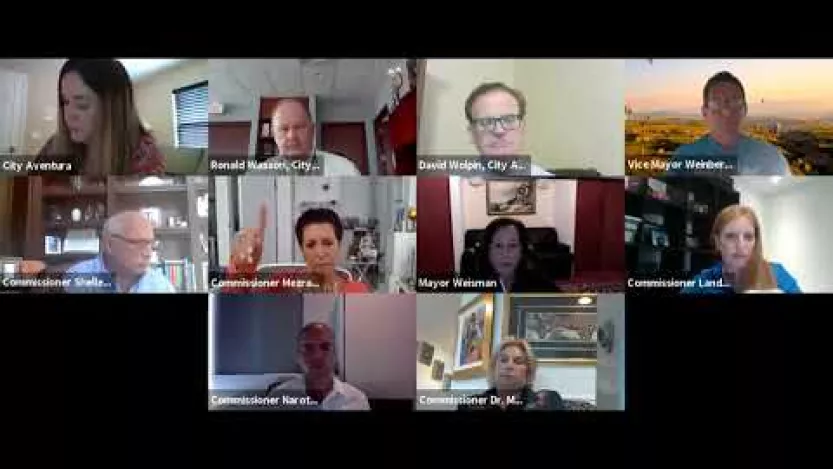Table of Contents
City of Aventura demands Florida State University’s administration violate a student's rights over social media comments

The Westcott Building, Florida State's main administrative building. (FSU Photography Services)
At Florida State University, an undergraduate’s online comments — some of them posted when he was 12 years old — have yielded calls for the university’s administration to remove him from his role as president of the student senate, if not his expulsion from the university. Now, a city council at the opposite end of the state has passed a formal resolution joining calls for FSU administrators to remove Ahmad Daraldik from the student government.
Much of the criticism has focused on Daraldik’s “stupid jew thinks he is cool” comment, which he posted on Facebook in 2013 in response to a photo — said to be staged — purporting to depict an Israeli soldier with his foot on a child.
Daraldik responded to the criticism in an interview with a local newspaper:
“I understand it could potentially be staged, but I was 12 years old and it was hard to differentiate what was real and was not real because there was so much happening,” Daraldik said. “I was a resident in Palestine at the time and I couldn’t differentiate between a Jew, a Zionist and an IDF soldier because of the [military] occupation.”
Critics also point to a 2019 Instagram photo depicting Daraldik standing in front of a statue of Nelson Mandela in Ramallah, captioned: “iconic. #fucktheoccupation #fuckisrael,” as well as a website (apparently made when he was a sophomore in high school) that compares Israel to Nazi Germany.
FIRE has long warned that government application of the IHRA definition in adjudicating student or faculty expression would violate the First Amendment and silence campus debate.
That comparison — which critics charge was echoed in a recent video in which Daraldik defended his Instagram photo — drew complaints that his remarks meet the International Holocaust Remembrance Alliance’s definition of anti-Semitism, which includes “[d]rawing comparisons of contemporary Israeli policy to that of the Nazis” as a form of anti-Semitic speech. FIRE has long warned that government application of the IHRA definition in adjudicating student or faculty expression would violate the First Amendment and silence campus debate.
The controversy over Daraldik’s posts has caught the attention of Florida’s director of emergency management, as well as a state legislator, who raised the possibility of withholding the university’s funding. At least one organization has called for Daraldik’s expulsion, while others have called for Daraldik to voluntarily step down.
Now, a city in south Florida has joined that chorus of critics. Last week, the City Commission of Aventura, Florida, unanimously adopted a resolution denouncing Daraldik and calling on FSU’s president to “demonstrate [FSU]’s intolerance for such anti-Semitic social media posts by taking action, including the condemnation of the social media posts, and the removal of” Daraldik as president of the student government. (FSU’s president has criticized Daraldik publicly and met with him privately.) The council’s discussions about the matter were held via Zoom:

It’s not unusual for city councils to offer resolutions on political affairs, whether local or international. Nor is it uncommon for city councils — or other legislative bodies — to call for universities to violate students’ First Amendment rights.
The request by the Aventura officials would, if granted, do exactly that.
Many of Daraldik’s critics have pressured him to resign or called for the student government to remove him. The First Amendment would not, of course, be violated if Daraldik resigned under pressure from the public or other students. Nor does it offend the First Amendment for governmental bodies to remove their own leaders if they believe that the leader’s expression or conduct renders them unfit to serve. (The student government held a vote of no confidence in Daraldik, but the measure failed.)
When government officials demonstrate ignorance of the First Amendment, it’s hard to expect that members of the public — or undergraduate students — will respect these fundamental rights.
However, public university administrators violate the First Amendment rights of both student and student government when the administration nullifies student government elections or refuses a student government appointment due to speech protected by the First Amendment. However offensive others might find Daraldik’s comments — whether they were made when he was 12 years old or yesterday — a public university’s administrators cannot punish a student for online expression that does not fall into a recognized exception to the First Amendment, like true threats, or rise to the level of discriminatory conduct or harassment.
Even if the First Amendment did not mandate that outcome, basic principles of shared governance require that the student body — not administrators — determine who represents its constituents.
And, of course, FSU — a public university — would very clearly violate the First Amendment if, as some have urged, it expelled Daraldik for protected speech.
It’s unlikely that Florida State University will take seriously a resolution from a city council situated some 450 miles south. As the most recent school to join FIRE’s list of “green light” institutions, we hope that Florida State will act consistently with its own policies — and, to its credit, the university has not indicated that it will investigate or punish Daraldik.
However, it should give us pause when official bodies — whether they are student governments, municipal entities, or state legislatures — call on universities to violate the First Amendment. When government officials, guided by an attorney, demonstrate ignorance of the First Amendment, it’s hard to expect that members of the public — or undergraduate students — will respect these fundamental rights. Elected officials, high or petty, should set a better example.
Recent Articles
Get the latest free speech news and analysis from FIRE.

Can the government ban controversial public holiday displays?

The trouble with banning Fizz

FIRE's 2025 impact in court, on campus, and in our culture
